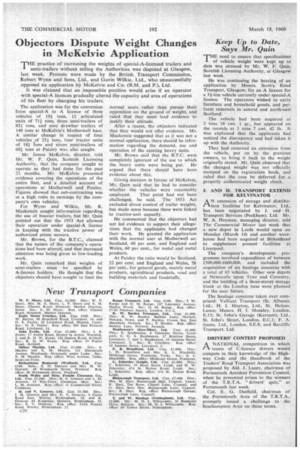Objectors Dispute Weight Changes in McKelvie Application
Page 56

If you've noticed an error in this article please click here to report it so we can fix it.
T" practice of increasing the weights of special-A-licensed trailers and semi-trailers without telling the Authorities was disputed at Glasgow, last week. Protests were made by the British_ Transport Commission, Robert Wynn and Sons, Ltd., and Gavin Wilkie, Ltd., who unsuccessfully opposed an application by McKelvie and Co. (BM. and P.), Ltd.
It was claimed that an impossible position would arise if an operator with special-A licences gradually altered the capacity and area of operations of his fleet by changing his trailers.
The application was for the conversion from special-A to • A licence of three vehicles of. 19i tons, 12 articulated units Of 711 tons, three semi-trailers of 831 tons, and nine drawbar trailers of 140 tons at McKeIvie'S Motherwell base. A similar change in respect of four vehicles of 23/ tons, four tractor units of 181 tons and lerVell semi-trailers of 60f tons at Paisley was also sought.
Mr. James McKelvie, director, told Mr. W. F. Quin, Scottish Licensing Authority, that the company sought to operate as they had done for the past 21 months. Mr. McKelvie presented evidence covering the operations of the entire fleet, and a detailed account of operations at Motherwell and Paisley. Figures showed that sub-contracting was at a high ratio to earnings by the company's own vehicles.
For Wynn and Wilkie, Mr. R. Mackenzie sought information regarding the use of heavier trailers, but Mr. Quin pointed out that • the 1953 Act allowed their operation under special-A licence in keeping with the tractive power of authorized prime movers.
Mr. Brown, for the B.T.C., claimed that the nature of the company's operations had been altered, and that increased attention was being given to low-loading work.
Mr. Quin remarked that weights of semi-trailers must be specified by A-licence holders. He thought that the objectors should have sought to limit the normal users rather than pursue their opposition on the ground of weight, and ruled that they must lead evidence to justify their attitude.
After a recess, the objectors indicated that they would not offer evidence, Mr. Mackenzie suggested that as it was not a normal application, there should be information regarding the demand, use and operation of the existing heavy units. .
Mr. Brown said that the B.T.0 were completely ignorant of the use to which the heavy units were being put. He argued that there should ha-ve been evidence about this.
Giving decision in favour of McKelvie, Mr. Quin said that he had to consider whether the vehicles were reasonably employed. That point had not been challenged, he said. . The 1953 Act excluded direct control of trailer weights, but made sense because these were linked to tractive-unit capacity.
He commented that the objectors had not led evidence to support their allegations that the applicants had changed their work. He granted the application with the normal user at Motherwell as: Scotland, 40 per cent, and England and Wales, 60 per cent., for metal and metal products.
At Paisley the ratio would be Scotland, 22 per cent. and England and Wales, 78 per cent., for general goods, mainly metal products, agricultural products, road and building materials and foodstuffs.
























































































































